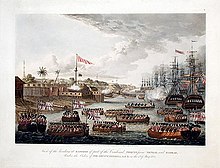First Anglo-Burmese War
In the First British-Burmese War from 1824 to 1826, Burma was subject to the British East India Company and had to cede Assam , Manipur , Arakan and Tenasserim .
background
The Burmese kingdom pursued a policy of expansion at the expense of the smaller states of Assam and Manipur , Arakan , Manipur and Cachar . In 1784 Burmese troops conquered Arakan and recruited forced laborers from the defeated population for use in Burma. As a result, tens of thousands of Arakans fled to India in 1798 . The Burmese royal court regarded the refugees as renegade serfs. In 1819 there were raids by the Burmese against Manipur and Cachar. In 1822, Burmese troops captured Assam. In 1823 Burmese troops attacked a British position.
The British East India Company reacted to the advance of Burma with a protection agreement against Manipur. This led to the British declaration of war after failed negotiations with Burma in 1824.
course
The military counter-operations began on March 5, 1824. Colonel Archibald Campbell was entrusted with the supreme command. The Burmese soldiers were ousted from Assam, Arakan and Manipur in the following two years . On February 24, 1826, Bagyidaw had to sign the Yandaboo Treaty. The Burmese king had to cede Assam, Manipur, Arakan and also Tenasserim to the British.
Thanks to their artillery on the ground and on ships, the British troops were clearly superior to the Burmese in battles for forts and settlements. However, the area presented the troops with major problems with supplies and tropical diseases. The Burmese civilian population withdrew from the access of the British troops and could therefore hardly be used for requisitions.
consequences
John Crawfurd , the first British envoy after the war, was subsequently unable to conclude a trade agreement, nor to arrange for government officials to be exchanged between the capitals of Ava and Calcutta . His successor, Major Henry Burney , was more successful by persuading the king to accept an English representation with his charming demeanor. His greatest achievement was probably the settlement of the dispute between Manipur and Burma over the valley of Kabaw, which he closed to Burma.
In Great Britain the war was seen militarily as a success. However, its results were seen as a political failure, as the territorial gains were seen as a financial burden. With the increasing expansion of the British Empire, this attitude changed and in 1852 the Second Anglo-Burmese War broke out .
Individual evidence
- ^ A b c d Peter A. Lorge: The Asian Military Revolution - From Gunpowder to the Bomb. Cambridge, 2008, p. 156f
literature
- Daniel George Edward Hall: Burma (= Hutchinson's University Library. British Empire History ). 2nd edition. Hutchinson's University Library, London 1956.

